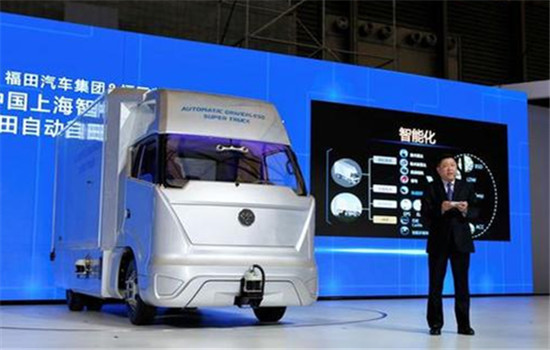
Baidu worked with Foton Motor Group to unveil a driverless truck. (Photo provided to chinadaily.com.cn)
Autonomous commercial vehicles may overtake traditional cars in the near future.
"The mass deployment and implementation of driverless commercial cars may witness a boom as strong demand is projected for non-price sensitive buyers, usually company buyers," said Gu Weihao, general manager of Baidu Intelligent Vehicle, known as the L3 Division of the internet company.[Special coverage]
Established in September at the Baidu World Conference 2016, the L3 Division aims to help automakers in automating and upgrading their products for autonomous implementations.
Gu said that although the country's development of self-driving commercial vehicles lagged behind other countries, the market scale has huge potential.
According to Gu, driverless commercial cars have many advantages, such as higher safety, energy savings, management and operation cost savings.
The company recently jointly worked with Foton Motor Group to unveil a driverless truck, which uses the latest connected-cars technologies developed by the two companies.
Named as "super truck", the car is powered by both Baidu's limited self-driving automation and Foton's driverless technologies and big data of commercial vehicles.
The U.S. Department of Transportation's National Highway Traffic Safety Administration (NHTSA) defined vehicle automation into five levels, the higher the level the more automated the vehicle is.
L3, or Level 3, refers to the Limited Self-Driving Automation, which is expected to be available for occasional control, but with sufficiently comfortable transition time.
Vehicles with level 4 in automation may be referred to autonomous vehicles.
According to the NHTSA's standard, both occupied and unoccupied vehicles who are qualified for L4 or Full Self-Driving Automation, are designed to perform all safety-critical driving functions and monitor roadway conditions without human control for an entire trip.
The latest generation Google car and Baidu's newly tested driverless vehicles are examples of the L4 cars.
Baidu has gradually become a software solution provider for both auto manufacturers and semiconductor makers in the industry.
The statistics polymerized by Baidu's Learning Map platform and in-car telematics and entertaining applications, such as CarLife and CoDriver, will help drivers have a safer, more convenient and more cost-effective driving experience.
Currently, there are overall more than 60 automobile manufactures working closely with Baidu to hit the market and more than 150 cars are fitted with the firm's intelligent vehicle software.
"We'll further collaborate with commercial vehicle OEMs to develop self-driving solutions and build typical application scenarios," said Gu. "On the other hand, being one of pioneers in the industry, we'd like to introduce more self-driving technology providers to participate and grab a piece of the market share."
During the ongoing 3rd World Internet Conference in Wuzhen, Baidu showcased the L4 driverless cars developed by its autonomous driving arm and automakers of Chery, BYD and Shou Qi Group.
Wang Jin, senior vice-president of Baidu and general manager of the company's Autonomous Driving Unit, said the cameras on the vehicles have an accuracy of 90.13 percent to judge objects, the highest level in the world.
For judgment of pedestrians the accuracy level reaches 95 percent and for traffic lights it is 99.9 percent. But the accuracy still needs to improve, Wang added.
In the third quarter, Baidu set up two funds, Baidu Venture and Baidu Capital, to invest in projects in artificial intelligence (AI) and other internet sub-sectors.
Li Yanhong, known as Robin Li, the CEO of the company said that Baidu would offer more artificial-intelligence-based innovative products such as a Siri-like smart secretary and driverless cars for further expansion.
The company's U.S. subsidiary has been lately issued a permit to test self-drive vehicles in California.
Since it joined the race with Google and Tesla Motors for R&D on autonomous cars in 2013, Baidu's driverless car has already completed trail runs in mixed road conditions.
More road tests in various weather, road and traffic conditions will be conducted in 10 cities across the country.


















































